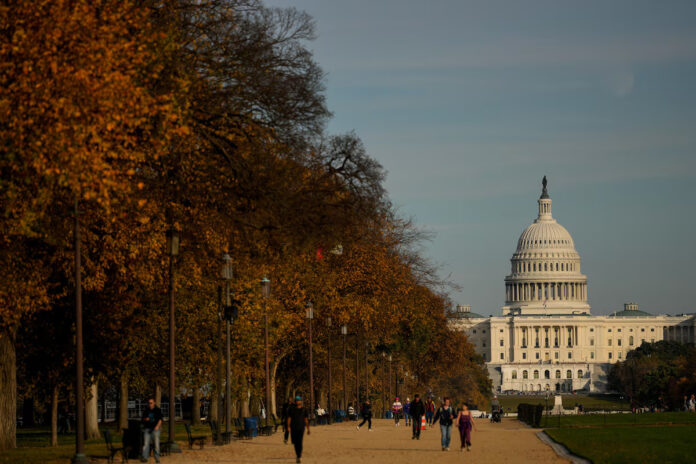After more than a month of political stalemate, faint signs of progress appeared on Monday toward ending the near-record 34-day U.S. federal government shutdown, which has disrupted key services and left hundreds of thousands of federal workers unpaid.
The shutdown began at the start of the new fiscal year on October 1, after Congress and President Donald Trump failed to agree on legislation to fund government operations.
The impasse has frozen around $1.7 trillion in discretionary spending, roughly one-third of annual U.S. expenditures, and forced the suspension or curtailment of programs aiding low-income Americans, airport operations, and even U.S. soldiers’ paychecks.
For the first time in weeks, leading senators from both parties expressed cautious optimism that an “off-ramp” may be in sight. “I’m optimistic,” said Senate Majority Leader John Thune (R–S.D.), while adding with a note of caution, “Don’t push it.” He said he sensed that negotiators were “getting close” to a resolution.
His Democratic counterpart, Senate Majority Whip Dick Durbin (D–Ill.), agreed that the mood had shifted slightly. “I sense that, too,” Durbin said, though he warned that major differences remain, particularly over the fate of health insurance subsidies that Democrats want to extend.
The dispute over extending an Affordable Care Act (ACA) subsidy for low-income Americans has become a central sticking point. Without a deal, many families are seeing food stamp benefits lapse and healthcare support diminish.
Senate Appropriations Committee Chair Susan Collins (R–Maine) described the latest talks as more constructive than previous efforts. “It just feels better this week,” she told reporters, noting that Democrats had offered specific legislative language to bridge the gap.
But she cautioned, “It could all fall apart again. And I don’t mean to imply there’s an agreement.”
Meanwhile, a small bipartisan group in the House of Representatives has floated a potential compromise.
According to Axios, four centrist lawmakers, three Republicans and one Democrat, proposed extending the expanded ACA tax credit for two years, paired with new income caps to limit eligibility for higher earners.
Despite these tentative moves, the end of the shutdown is not yet assured. Negotiators from both parties continued talks through the weekend, seeking to craft a deal that could reopen government agencies and restore stability to millions of affected Americans.
Still, after weeks of gridlock and growing frustration nationwide, even modest signs of cooperation were viewed on Capitol Hill as a welcome, if fragile, step forward.
Source: Reuters
Written By Rodney Mbua



















